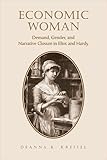Economic Woman : Demand, Gender, and Narrative Closure in Eliot and Hardy / Deanna K. Kreisel.
Material type: TextPublisher: Toronto : University of Toronto Press, [2016]Copyright date: ©2011Description: 1 online resource (320 p.) : 1 FigureContent type:
TextPublisher: Toronto : University of Toronto Press, [2016]Copyright date: ©2011Description: 1 online resource (320 p.) : 1 FigureContent type: - 9781442642492
- 9781442694149
- 823/.8093553
- online - DeGruyter
| Item type | Current library | Call number | URL | Status | Notes | Barcode | |
|---|---|---|---|---|---|---|---|
 eBook
eBook
|
Biblioteca "Angelicum" Pont. Univ. S.Tommaso d'Aquino Nuvola online | online - DeGruyter (Browse shelf(Opens below)) | Online access | Not for loan (Accesso limitato) | Accesso per gli utenti autorizzati / Access for authorized users | (dgr)9781442694149 |
Browsing Biblioteca "Angelicum" Pont. Univ. S.Tommaso d'Aquino shelves, Shelving location: Nuvola online Close shelf browser (Hides shelf browser)

|

|

|

|

|

|

|
||
| online - DeGruyter Godwinian Moments : From the Enlightenment to Romanticism / | online - DeGruyter Allan King's A Married Couple / | online - DeGruyter Guy Maddin's My Winnipeg / | online - DeGruyter Economic Woman : Demand, Gender, and Narrative Closure in Eliot and Hardy / | online - DeGruyter Red Quarter Moon : A Search for Family in the Shadow of Stalin / | online - DeGruyter Forms of Modernity : Don Quixote and Modern Theories of the Novel / | online - DeGruyter The Correspondence of Erasmus : Letters 2082 to 2203, Volume 15 / |
Frontmatter -- Contents -- Acknowledgments -- Introduction: Demand; or, the Cephalopod -- 1. Popular Demand: Surplus and Stagnation in Nineteenth-Century Political Economy -- 2. ‘Fine Clothes an’ Waste’: Utopian Economy and the Problem of Femininity in Adam Bede -- 3. Superfluity and Suction: The Problem with Saving in The Mill on the Floss -- 4. ‘All Was Over at Last’: Epistemological and Domestic Economies in The Mayor of Casterbridge -- 5. Self-Sacrifice, Skillentons, and Mother’s Milk: The Internalization of Demand in Tess -- Notes -- Works Cited -- Index
restricted access online access with authorization star
http://purl.org/coar/access_right/c_16ec
The ways in which women are portrayed in Victorian novels can provide important insights into how people of the day thought about political economy, and vice versa. In Economic Woman, Deanna K. Kreisel innovatively shows how images of feminized sexuality in novels by George Eliot and Thomas Hardy reflected widespread contemporary anxieties about the growth of capitalism. Economic Woman is the first book to address directly the links between classical political economy and gender in the novel. Examining key works by Eliot and Hardy, including The Mill on the Floss and Tess of the d’Urbervilles, Kreisel investigates the meaning of two female representations: the ‘economic woman,’ who embodies idealized sexual restraint and wise domestic management, and the degraded prostitute, characterized by sexual excess and economic turmoil. Kreisel effectively integrates economic thought with literary analysis to contribute to an ongoing and lively scholarly discussion.
Mode of access: Internet via World Wide Web.
In English.
Description based on online resource; title from PDF title page (publisher's Web site, viewed 01. Dez 2023)


